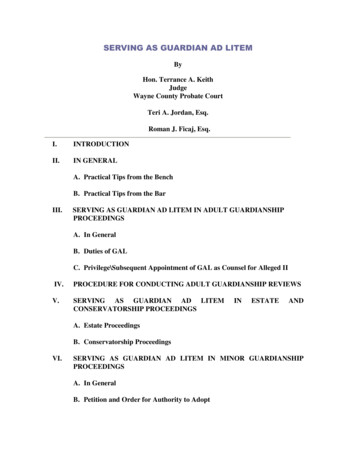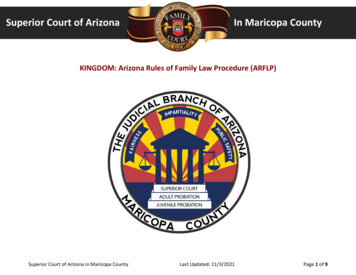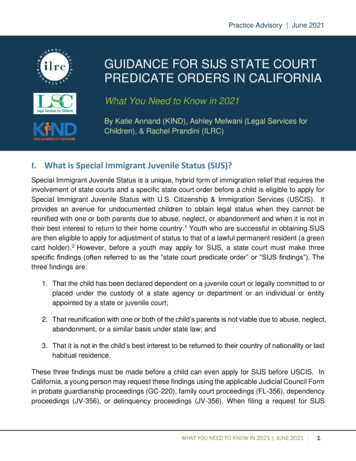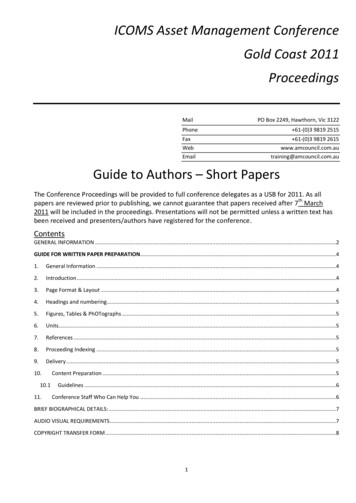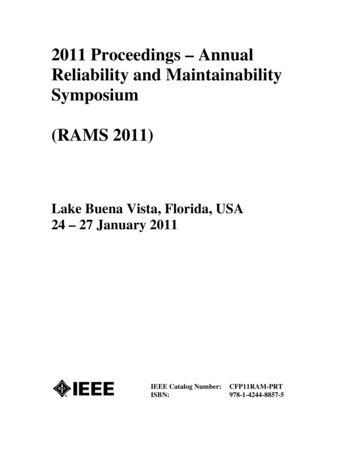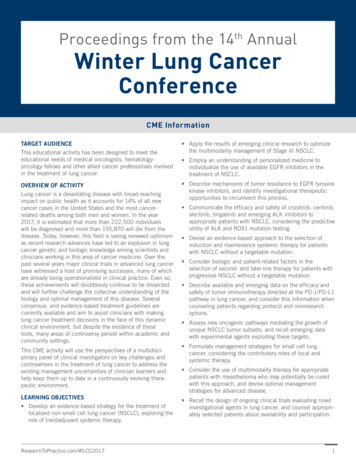
Transcription
Proceedings from the 14th AnnualWinter Lung CancerConferenceCME InformationTARGET AUDIENCEThis educational activity has been designed to meet theeducational needs of medical oncologists, hematologyoncology fellows and other allied cancer professionals involvedin the treatment of lung cancer. Apply the results of emerging clinical research to optimizethe multimodality management of Stage III NSCLC.OVERVIEW OF ACTIVITYLung cancer is a devastating disease with broad-reachingimpact on public health as it accounts for 14% of all newcancer cases in the United States and the most cancerrelated deaths among both men and women. In the year2017, it is estimated that more than 222,500 individualswill be diagnosed and more than 155,870 will die from thedisease. Today, however, this field is seeing renewed optimismas recent research advances have led to an explosion in lungcancer genetic and biologic knowledge among scientists andclinicians working in this area of cancer medicine. Over thepast several years major clinical trials in advanced lung cancerhave witnessed a host of promising successes, many of whichare already being operationalized in clinical practice. Even so,these achievements will doubtlessly continue to be dissectedand will further challenge the collective understanding of thebiology and optimal management of this disease. Severalconsensus- and evidence-based treatment guidelines arecurrently available and aim to assist clinicians with makinglung cancer treatment decisions in the face of this dynamicclinical environment, but despite the existence of thesetools, many areas of controversy persist within academic andcommunity settings. Describe mechanisms of tumor resistance to EGFR tyrosinekinase inhibitors, and identify investigational therapeuticopportunities to circumvent this process.This CME activity will use the perspectives of a multidisciplinary panel of clinical investigators on key challenges andcontroversies in the treatment of lung cancer to address theexisting management uncertainties of clinician learners andhelp keep them up to date in a continuously evolving therapeutic environment.LEARNING OBJECTIVES Develop an evidence-based strategy for the treatment oflocalized non-small cell lung cancer (NSCLC), exploring therole of (neo)adjuvant systemic therapy.ResearchToPractice.com/WLCC2017 Employ an understanding of personalized medicine toindividualize the use of available EGFR inhibitors in thetreatment of NSCLC. Communicate the efficacy and safety of crizotinib, ceritinib,alectinib, brigatinib and emerging ALK inhibitors toappropriate patients with NSCLC, considering the predictiveutility of ALK and ROS1 mutation testing. Devise an evidence-based approach to the selection ofinduction and maintenance systemic therapy for patientswith NSCLC without a targetable mutation. Consider biologic and patient-related factors in theselection of second- and later-line therapy for patients withprogressive NSCLC without a targetable mutation. Describe available and emerging data on the efficacy andsafety of tumor immunotherapy directed at the PD-1/PD-L1pathway in lung cancer, and consider this information whencounseling patients regarding protocol and nonresearchoptions. Assess new oncogenic pathways mediating the growth ofunique NSCLC tumor subsets, and recall emerging datawith experimental agents exploiting these targets. Formulate management strategies for small cell lungcancer, considering the contributory roles of local andsystemic therapy. Consider the use of multimodality therapy for appropriatepatients with mesothelioma who may potentially be curedwith this approach, and devise optimal managementstrategies for advanced disease. Recall the design of ongoing clinical trials evaluating novelinvestigational agents in lung cancer, and counsel appropriately selected patients about availability and participation.1
ACCREDITATION STATEMENTResearch To Practice is accredited by the AccreditationCouncil for Continuing Medical Education to providecontinuing medical education for physicians.CREDIT DESIGNATION STATEMENTResearch To Practice designates this enduring material for amaximum of 10.25 AMA PRA Category 1 Credits . Physiciansshould claim only the credit commensurate with the extent oftheir participation in the activity.AMERICAN BOARD OF INTERNAL MEDICINE (ABIM) —MAINTENANCE OF CERTIFICATION (MOC)Successful completion of this CME activity, which includesparticipation in the evaluation component, enables the participant to earn up to 10.25 Medical Knowledge MOC points inthe American Board of Internal Medicine’s (ABIM) Maintenance of Certification (MOC) program. Participants will earnMOC points equivalent to the amount of CME credits claimedfor the activity. It is the CME activity provider’s responsibilityto submit participant completion information to ACCME for thepurpose of granting ABIM MOC credit.Please note, this program has been specifically designed forthe following ABIM specialty: medical oncology.Personal information and data sharing: Research To Practiceaggregates deidentified user data for program-use analysis,program development, activity planning and site improvement.We may provide aggregate and deidentified data to thirdparties, including commercial supporters. We do not shareor sell personally identifiable information to any unaffiliatedthird parties or commercial supporters. Please see our privacypolicy at ResearchToPractice.com/Privacy-Policy for moreinformation.HOW TO USE THIS CME ACTIVITYThis CME activity consists of a video component. To receivecredit, the participant should watch the video, completethe Post-test with a score of 80% or better and fill outthe Educational Assessment and Credit Form located atResearchToPractice.com/WLCC2017/CME.CONTENT VALIDATION AND DISCLOSURESResearch To Practice (RTP) is committed to providing itsparticipants with high-quality, unbiased and state-of-theart education. We assess conflicts of interest with faculty,planners and managers of CME activities. Conflicts of interestare identified and resolved through a conflict of interestresolution process. In addition, all activity content is reviewedby both a member of the RTP scientific staff and an external,independent physician reviewer for fair balance, scientificobjectivity of studies referenced and patient care recommendations.FACULTY — The following faculty (and their spouses/partners)reported relevant conflicts of interest, which have beenresolved through a conflict of interest resolution process:Paul A Bunn Jr, MDDistinguished Professor and James Dudley Chairin Cancer ResearchUniversity of Colorado Cancer CenterAurora, ColoradoAdvisory Committee: Genentech BioOncology, Lilly; ConsultingAgreements: AstraZeneca Pharmaceuticals LP, Celgene Corporation, EMD Serono Inc, Genentech BioOncology, Lilly, Merck,Novartis, Pfizer Inc.Roy H Decker, MD, PhDAssociate Professor of Therapeutic RadiologyClinical Research Program Leader, Therapeutic RadiologyDirector, Residency Training ProgramDirector, Thoracic/Stereotactic Body Radiotherapy ProgramVice Chair for Clinical ResearchYale Comprehensive Cancer CenterYale School of MedicineNew Haven, ConnecticutContracted Research: Merck.Roy S Herbst, MD, PhDEnsign Professor of Medicine (Oncology)Professor of PharmacologyChief of Medical OncologyDirector, Thoracic Oncology Research ProgramAssociate Director for Translational ResearchYale Comprehensive Cancer CenterYale School of MedicineNew Haven, ConnecticutConsulting Agreements: AstraZeneca PharmaceuticalsLP, Genentech BioOncology, Kolltan Pharmaceuticals Inc,Lilly, Merck, Pfizer Inc; Contracted Research: GenentechBioOncology, Merck.Karen Kelly, MDProfessor of MedicineAssociate Director for Clinical ResearchJennifer Rene Harmon Tegley and Elizabeth Erica HarmonEndowed Chair in Cancer Clinical ResearchUC Davis Comprehensive Cancer CenterSacramento, CaliforniaAdvisory Committee: Ariad Pharmaceuticals Inc, AstraZenecaPharmaceuticals LP, Boehringer Ingelheim Pharmaceuticals Inc, Bristol-Myers Squibb Company, G1 Therapeutics,Genentech BioOncology, Lilly; Contracted Research: AbbVieInc, Celgene Corporation, EMD Serono Inc, Five Prime Therapeutics Inc, Genentech BioOncology, Gilead Sciences Inc;Data Monitoring Committee: AstraZeneca PharmaceuticalsLP, Genentech BioOncology; Other Remunerated Activities:UpToDate Inc.Mark G Kris, MDWilliam and Joy Ruane Chair in Thoracic OncologyAttending Physician, Thoracic Oncology ServiceMemorial Sloan Kettering Cancer CenterNew York, New YorkNo relevant conflicts of interest to disclose.ResearchToPractice.com/WLCC20172
Corey J Langer, MDDirector of Thoracic OncologyAbramson Cancer CenterProfessor of MedicinePerelman School of MedicineUniversity of PennsylvaniaVice Chair, Radiation Therapy Oncology GroupPhiladelphia, PennsylvaniaExelixis Inc, Genentech BioOncology, Merck, Nektar, Novartis,Roche Laboratories Inc.Advisory Committee: Abbott Laboratories, AstraZenecaPharmaceuticals LP, Boehringer Ingelheim PharmaceuticalsInc, Bristol-Myers Squibb Company, Celgene Corporation,EMD Serono Inc, Genentech BioOncology, GlaxoSmithKline,ImClone Systems, a wholly owned subsidiary of Eli Lillyand Company, Lilly, Merck, Novartis, Pfizer Inc; ConsultingAgreements: AstraZeneca Pharmaceuticals LP, BoehringerIngelheim Pharmaceuticals Inc, Bristol-Myers SquibbCompany, Celgene Corporation, Genentech BioOncology,GlaxoSmithKline, ImClone Systems, a wholly owned subsidiaryof Eli Lilly and Company, Lilly, Merck, Novartis, Pfizer Inc;Contracted Research: Advantagene Inc, Celgene Corporation,GlaxoSmithKline, Merck, Inovio Pharmaceuticals Inc; Data andSafety Monitoring Board: Abbott Laboratories, Amgen Inc,Lilly, Peregrine Pharmaceuticals Inc, Synta PharmaceuticalsCorp.Advisory Committee: Ariad Pharmaceuticals Inc, AstraZenecaPharmaceuticals LP, Boehringer Ingelheim Pharmaceuticals Inc, Genentech BioOncology, Inivata, Takeda Oncology;Consulting Agreements: AstraZeneca Pharmaceuticals LP,Boehringer Ingelheim Pharmaceuticals Inc.Rogerio C Lilenbaum, MD (Co-Chair and Moderator)Professor of MedicineYale School of MedicineChief Medical OfficerSmilow Cancer HospitalYale Cancer CenterNew Haven, ConnecticutAdvisory Committee: AstraZeneca Pharmaceuticals LP,Celgene Corporation, Genentech BioOncology; ConsultingAgreement: Roche Laboratories Inc; Contracted Research:Celgene Corporation.Barbara L McAneny, MDMember, Board of TrusteesAmerican Medical AssociationCEO of New Mexico Oncology Hematology Consultants LtdAlbuquerque, New MexicoNo relevant conflicts of interest to disclose.Joel W Neal, MD, PhDAssistant Professor of MedicineDivision of OncologyStanford Cancer InstituteStanford UniversityPalo Alto, CaliforniaConsulting Agreements: Ariad Pharmaceuticals Inc, ARMOBioSciences, Boehringer Ingelheim Pharmaceuticals Inc,CARET/Physician Resource Management, Clovis Oncology,Nektar; Contracted Research: Ariad Pharmaceuticals Inc,ArQule Inc, Boehringer Ingelheim Pharmaceuticals Inc,ResearchToPractice.com/WLCC2017Geoffrey R Oxnard, MDLowe Center for Thoracic OncologyDana-Farber Cancer InstituteAssistant Professor of MedicineHarvard Medical SchoolBoston, MassachusettsNathan A Pennell, MD, PhDAssociate Professor, Hematology and Medical OncologyCleveland Clinic Lerner College of Medicineof Case Western Reserve UniversityDirector, Cleveland Clinic Lung CancerMedical Oncology ProgramCleveland, OhioAdvisory Committee: AstraZeneca Pharmaceuticals LP,Boehringer Ingelheim Pharmaceuticals Inc; ContractedResearch: AstraZeneca Pharmaceuticals LP, BayerHealthCare Pharmaceuticals, Celgene Corporation, GenentechBioOncology, Merck, Pfizer Inc.Naiyer Rizvi, MDProfessor of MedicineDirector of Thoracic Oncology andPhase I ImmunotherapeuticsPrice Chair in Clinical Translational ResearchColumbia University Medical CenterNew York, New YorkAdvisory Committee and Consulting Agreements: AstraZenecaPharmaceuticals LP, Merck, Novartis, Roche Laboratories Inc;Ownership Interest: Gritstone Oncology.Alice Shaw, MD, PhDAssociate Professor of MedicineHarvard Medical SchoolCenter for Thoracic CancersMassachusetts General HospitalBoston, MassachusettsAdvisory Committee: EMD Serono Inc, GenentechBioOncology, Novartis, Pfizer Inc, Roche Laboratories Inc;Consulting Agreements: Blueprint Medicines, Daiichi SankyoInc, EMD Serono Inc, Ignyta Inc, Novartis, Pfizer Inc, RocheLaboratories Inc, Taiho Oncology Inc.Mark A Socinski, MD (Co-Chair and Moderator)Executive Medical DirectorMember, Thoracic Oncology ProgramFlorida Hospital Cancer InstituteOrlando, Florida3
Advisory Committee: Bristol-Myers Squibb Company, TakedaOncology; Contracted Research: AstraZeneca Pharmaceuticals LP, Bristol-Myers Squibb Company, Celgene Corporation,Genentech BioOncology, GlaxoSmithKline, Lilly, Pfizer Inc;Speakers Bureau: Bristol-Myers Squibb Company, CelgeneCorporation, Genentech BioOncology.Thomas E Stinchcombe, MDCo-Director, Multidisciplinary Thoracic Oncology ProgramDuke University School of MedicineDurham, North CarolinaConsulting Agreements: Boehringer Ingelheim Pharmaceuticals Inc, Celgene Corporation, Lilly; Contracted Research:Bristol-Myers Squibb Company, EMD Serono Inc, GenentechBioOncology.Eric Vallières, MDSurgical Director, Lung Cancer ProgramMedical Director, Division of Thoracic SurgerySwedish Cancer InstituteSeattle, WashingtonConsulting Agreements: Genentech BioOncology,GlaxoSmithKline, Spiration Inc.MODERATOR AND CO-CHAIR — Dr Love is president andCEO of Research To Practice, which receives funds in theform of educational grants to develop CME activities from thefollowing commercial interests: AbbVie Inc, Acerta Pharma,Adaptive Biotechnologies, Agendia Inc, Amgen Inc, AriadPharmaceuticals Inc, Array BioPharma Inc, Astellas PharmaGlobal Development Inc, AstraZeneca Pharmaceuticals LP,Baxalta Inc, Bayer HealthCare Pharmaceuticals, BiodesixInc, bioTheranostics Inc, Boehringer Ingelheim Pharmaceuticals Inc, Boston Biomedical Pharma Inc, Bristol-MyersSquibb Company, Celgene Corporation, Clovis Oncology, CTIBioPharma Corp, Dendreon Pharmaceuticals Inc, Eisai Inc,Exelixis Inc, Foundation Medicine, Genentech BioOncology,Genomic Health Inc, Gilead Sciences Inc, Halozyme Inc,ImmunoGen Inc, Incyte Corporation, Infinity PharmaceuticalsInc, Ipsen Biopharmaceuticals Inc, Janssen Biotech Inc, JazzPharmaceuticals Inc, Kite Pharma Inc, Lexicon Pharmaceuticals Inc, Lilly, Medivation Inc, a Pfizer Company, Merck,Merrimack Pharmaceuticals Inc, Myriad Genetic LaboratoriesResearchToPractice.com/WLCC2017Inc, NanoString Technologies, Natera Inc, Novartis, Novocure,Onyx Pharmaceuticals, an Amgen subsidiary, PharmacyclicsLLC, an AbbVie Company, Prometheus Laboratories Inc, PumaBiotechnology Inc, Regeneron Pharmaceuticals Inc, SanofiGenzyme, Seattle Genetics, Sigma-Tau Pharmaceuticals Inc,Sirtex Medical Ltd, Spectrum Pharmaceuticals Inc, TaihoOncology Inc, Takeda Oncology, Tesaro Inc, Teva Oncologyand Tokai Pharmaceuticals Inc.RESEARCH TO PRACTICE STAFF AND EXTERNALREVIEWERS — The scientific staff and reviewers for ResearchTo Practice have no relevant conflicts of interest to disclose.This educational activity contains discussion of published and/or investigational uses of agents that are not indicated by theFood and Drug Administration. Research To Practice does notrecommend the use of any agent outside of the labeled indications. Please refer to the official prescribing information foreach product for discussion of approved indications, contraindications and warnings. The opinions expressed are thoseof the presenters and are not to be construed as those of thepublisher or grantors.This activity is supported by educational grants fromAbbVie Inc, Ariad Pharmaceuticals, Inc, Astellas PharmaGlobal Development Inc, AstraZeneca Pharmaceuticals LP,Boehringer Ingelheim Pharmaceuticals Inc, Bristol-MyersSquibb Company, Celgene Corporation, Exelixis Inc,Foundation Medicine, Genentech BioOncology, Lilly, Merck,Myriad Genetic Laboratories Inc, Novartis and RegeneronPharmaceuticals Inc.Hardware/Software Requirements:A high-speed Internet connectionA monitor set to 1280 x 1024 pixels or moreInternet Explorer 7 or later, Firefox 3.0 or later, Chrome, Safari3.0 or laterAdobe Flash Player 10.2 plug-in or laterAdobe Acrobat Reader(Optional) Sound card and speakers for audioLast review date: June 2017Expiration date: June 20184
Select PublicationsHistory, Major Findings and Lessons Learned from the Lung Cancer Mutation ConsortiumPaul A Bunn Jr, MDAisner D et al. Effect of expanded genomic testing in lung adenocarcinoma (LUCA) on survival benefit: The Lung CancerMutation Consortium II (LCMC II) experience. Proc ASCO 2016;Abstract 11510.Awad MM. Impaired c-Met receptor degradation mediated by MET exon 14 mutations in non-small-cell lung cancer. J ClinOncol 2016;34(8):879-81.Bayliss R et al. Molecular mechanisms that underpin EML4-ALK driven cancers and their response to targeted drugs. Cell MolLife Sci 2015;73(6):1209-24.Camidge DR et al. Safety and efficacy of brigatinib (AP26113) in advanced malignancies, including ALK non–small cell lungcancer (NSCLC). Proc ASCO 2015;Abstract 8062.Ceccon M et al. Treatment efficacy and resistance mechanisms using the second-generation ALK inhibitor AP26113 in humanNPM-ALK-positive anaplastic large cell lymphoma. Mol Cancer Res 2015;13(4):775-83.Friboulet L et al. The ALK inhibitor ceritinib overcomes crizotinib resistance in non-small cell lung cancer. Cancer Discov2014;4(6):662-73.Goldman JW et al. Pretreatment and serial plasma assessments of EGFR mutations in NSCLC patients treated with rociletinib(CO-1686). Proc AACR 2015;Abstract 927.Katayama R et al. Two novel ALK mutations mediate acquired resistance to the next-generation ALK inhibitor alectinib. ClinCancer Res 2014;20(22):5686-96.Katayama R et al. Mechanisms of acquired crizotinib resistance in ALK-rearranged lung cancers. Sci Transl Med2012;4(120):120ra17.Kim D-W et al. Ceritinib in advanced anaplastic lymphoma kinase (ALK)-rearranged (ALK ) non-small cell lung cancer(NSCLC): Results of the ASCEND-1 trial. Proc ASCO 2016;Abstract 8003.Kodityal S et al. A novel acquired ALK F1245C mutation confers resistance to crizotinib in ALK-positive NSCLC but is sensitiveto ceritinib. Lung Cancer 2016;92:19-21.Kris MG et al. Using multiplexed assays of oncogenic drivers in lung cancers to select targeted drugs. JAMA2014;311(19):1998-2006.Maemondo M et al. Gefitinib or chemotherapy for non-small-cell lung cancer with mutated EGFR. N Engl J Med2010;362(25):2380-8.Mitsudomi T et al. Gefitinib versus cisplatin plus docetaxel in patients with non-small-cell lung cancer harbouring mutations ofthe epidermal growth factor receptor (WJTOG3405): An open label, randomised phase 3 trial. Lancet Oncol 2010;11(2):121-8.Mok TS et al. Gefitinib or carboplatin-paclitaxel in pulmonary adenocarcinoma. N Engl J Med 2009;361(10):947-57.Ou S-H et al. Efficacy and safety of the ALK inhibitor alectinib in ALK non-small-cell lung cancer (NSCLC) patients who havefailed prior crizotinib: An open-label, single-arm, global phase 2 study (NP28673). Proc ASCO 2015;Abstract 8008.Ramalingam S et al. Osimertinib as first-line treatment for EGFR mutation-positive advanced NSCLC: Updated efficacy andsafety results from two Phase I expansion cohorts. Proc ELCC 2016;Abstract LBA1 PR.Rosell R et al. Erlotinib versus chemotherapy (CT) in advanced non-small cell lung cancer (NSCLC) patients (p) with epidermalgrowth factor receptor (EGFR) mutations: Interim results of the European Erlotinib Versus Chemotherapy (EURTAC) phase IIIrandomized trial. Proc ASCO 2011;Abstract 7503.Sequist LV et al. Efficacy of rociletinib (CO-1686) in plasma-genotyped T790M-positive non-small cell lung cancer (NSCLC)patients (pts). Proc ASCO 2015;Abstract 8001.Shaw AT et al. Resensitization to crizotinib by the lorlatinib ALK resistance mutation L1198F. N Engl J Med 2016;374(1):5461.Shaw AT et al. Clinical activity and safety of PF-06463922 from a dose escalation study in patients with advanced ALK orROS1 NSCLC. Proc ASCO 2015;Abstract 8018.Shaw AT et al. Crizotinib in ROS1-rearranged non-small-cell lung cancer. N Engl J Med 2014;371(21):1963-71.Toyokawa G et al. Identification of a novel ALK G1123S mutation in a patient with ALK-rearranged non–small-cell lung cancerexhibiting resistance to ceritinib. J Thorac Onc 2015;10(7):e55-7.ResearchToPractice.com/WLCC20175
Weickhardt A et al. Continuation of EGFR/ALK inhibition after local therapy of oligoprogressive disease in EGFR mutant (Mt)and ALK non-small cell lung cancer (NSCLC). Proc ASCO 2012;Abstract 7526.Wu B et al. Pharmacokinetics (PK) of blinatumomab and its clinical implications. Proc ASCO 2013;Abstract 3048.Yang JC-H et al. LUX-Lung 3: A randomized, open-label, phase III study of afatinib versus pemetrexed and cisplatin as firstline treatment for patients with advanced adenocarcinoma of the lung harboring EGFR-activating mutations. Proc ASCO2012;Abstract LBA7500.Yu HA et al. Local therapy as a treatment strategy in EGFR-mutant advanced lung cancers that have developed acquired resistance to EGFR tyrosine kinase inhibitors. Proc ASCO 2012;Abstract 7527.Zou HY et al. PF-06463922, an ALK/ROS1 inhibitor, overcomes resistance to first and second generation ALK inhibitors inpreclinical models. Cancer Cell 2015;28(1):70-81.Session 1: Current and Future Application of Immunotherapy in Non-Small Cell Lung Cancer (NSCLC)Roy S Herbst, MD, PhDFacciabene A et al. T-regulatory cells: Key players in tumor immune escape and angiogenesis. Cancer Res 2012;72(9):2162-71.Herbst RS et al. Interim safety and clinical activity in patients with advanced NSCLC from a multi-cohort phase 1 study oframucirumab (R) plus pembrolizumab (P). Proc ESMO 2016;Abstract LBA38.Mellman I et al. Cancer immunotherapy comes of age. Nature 2011;480(7378):481-9.Reck M et al. KEYNOTE-024: Pembrolizumab (pembro) vs platinum-based chemotherapy (chemo) as first-line therapy foradvanced NSCLC with a PD-L1 tumor proportion score (TPS) 50%. Proc ESMO 2016;Abstract LBA8 PR.Reck M et al. Pembrolizumab versus chemotherapy for PD-L1-positive non-small-cell lung cancer. N Engl J Med2016;375(19):1823-33.Socinski M et al. CheckMate 026: A phase 3 trial of nivolumab vs investigator’s choice (IC) of platinum-based doublet chemotherapy (PT-DC) as first-line therapy for stage iv/recurrent programmed death ligand 1 (PD-L1)-positive NSCLC. Proc ESMO2016;Abstract LBA7 PR.Voron T et al. Control of the immune response by pro-angiogenic factors. Front Oncol 2014;4:70.Joel W Neal, MD, PhDBorghaei H et al. Nivolumab versus docetaxel in advanced nonsquamous non-small-cell lung cancer. N Engl J Med2015;373(17):1627-39.Brahmer J et al. Nivolumab versus docetaxel in advanced squamous-cell non-small-cell lung cancer. N Engl J Med2015;373(2):123-35.Garon EB et al. Pembrolizumab for the treatment of non-small-cell lung cancer. N Engl J Med 2015;372(21):2018-28.Gettinger SN et al. First-line monotherapy with nivolumab (NIVO; anti-programmed death-1 [PD-1]) in advanced non-smallcell lung cancer (NSCLC): Safety, efficacy and correlation of outcomes with PD-1 ligand (PD-L1) expression. Proc ASCO2015;Abstract 8025.Gettinger SN et al. Overall survival and long-term safety of nivolumab (anti-programmed death 1 antibody, BMS-936558,ONO-4538) in patients with previously treated advanced non-small-cell lung cancer. J Clin Oncol 2015;33(18):2004-12.Herbst RS et al. Pembrolizumab versus docetaxel for previously treated, PD-L1-positive, advanced non-small-cell lung cancer(KEYNOTE-010): A randomised controlled trial. Lancet 2016;387(10027):1540-50.Hirsch FR et al. PD-L1 immunohistochemistry assays for lung cancer: Results from phase 1 of the blueprint PD-L1 IHC assaycomparison project. J Thorac Oncol 2017;12(2):208-22.Horn L et al. Clinical activity, safety and predictive biomarkers of the engineered antibody MPDL3280A (anti-PDL1) innon-small cell lung cancer (NSCLC): Update from a phase Ia study. Proc ASCO 2015;Abstract 8029.Rebelatto MC et al. Development of a PD-L1 companion diagnostic assay for treatment with MEDI4736 in NSCLC and SCCHNpatients. Proc ASCO 2015;Abstract 8033.Rittmeyer A et al. Atezolizumab versus docetaxel in patients with previously treated non-small-cell lung cancer (OAK): A phase3, open-label, multicentre randomised controlled trial. Lancet 2017;389(10066):255-65.Rizvi NA et al. Cancer immunology. Mutational landscape determines sensitivity to PD-1 blockade in non-small cell lungcancer. Science 176
Naiyer Rizvi, MDGainor JF et al. EGFR mutations and ALK rearrangements are associated with low response rates to PD-1 pathway blockade innon-small cell lung cancer: A retrospective analysis. Clin Cancer Res 2016;22(18):4585-93.Hellmann MD et al. Nivolumab plus ipilimumab as first-line treatment for advanced non-small-cell lung cancer (CheckMate012): Results of an open-label, phase 1, multicohort study. Lancet Oncol 2016;18(1):31-41.Hui R et al. Long-term OS for patients with advanced NSCLC enrolled in the KEYNOTE-001 study of pembrolizumab (pembro).Proc ASCO 2016;Abstract 9026.Inoue Y et al. Prognostic impact of CD73 and A2A adenosine receptor expression in non-small-cell lung cancer. Oncotarget2017;8(5):8738-51.Lee CK et al. Checkpoint inhibitors in metastatic EGFR-mutated non-small cell lung cancer — A meta-analysis. J Thorac Oncol2017;12(2):403-7.Rizvi NA et al. Safety and response with nivolumab (anti-PD-1; BMS-936558, ONO-4538) plus erlotinib in patients (pts) withepidermal growth factor receptor mutant (EGFR MT) advanced NSCLC. Proc ASCO 2014;Abstract 8022.Vogelstein B et al. Cancer genome landscapes. Science 2013;339(6127):1546-58.Nathan A Pennell, MD, PhDAntonia S et al. Safety and antitumour activity of durvalumab plus tremelimumab in non-small cell lung cancer: A multicentre,phase 1b study. Lancet Oncol 2016;17(3):299-308.Gettinger S et al. First-line nivolumab monotherapy and nivolumab plus ipilimumab in patients with advanced NSCLC: Longterm outcomes from CheckMate 012. Proc WCLC 2016;Abstract OA03.01.Gubens MA et al. Phase I/II study of pembrolizumab (pembro) plus ipilimumab (ipi) as second-line therapy for NSCLC:KEYNOTE-021 cohorts D and H. Proc ASCO 2016;Abstract 9027.Langer C et al. Randomized, phase 2 study of carboplatin and pemetrexed with or without pembrolizumab as first-line therapyfor advanced NSCLC: KEYNOTE-021 cohort G. Proc ESMO 2016;Abstract LBA46 PR.Larkin J et al. Combined nivolumab and ipilimumab or monotherapy in untreated melanoma. N Engl J Med 2015;373(1):2334.Session 2: EGFR Mutation-Positive NSCLCPaul A Bunn Jr, MDAisner D et al. Effect of expanded genomic testing in lung adenocarcinoma (LUCA) on survival benefit: The Lung CancerMutation Consortium II (LCMC II) experience. Proc ASCO 2016;Abstract 11510.Drilon A et al. Broad, hybrid capture-based next-generation sequencing identifies actionable genomic alterations in lung adenocarcinomas otherwise negative for such alterations by other genomic testing approaches. Clin Cancer Res 2015;21(16):3631-9.Herbst RS et al. TRIBUTE: A phase III trial of erlotinib hydrochloride (OSI-774) combined with carboplatin and paclitaxelchemotherapy in advanced non-small-cell lung cancer. J Clin Oncol 2005;23(25):5892-9.Lippitz B et al. Stereotactic radiosurgery in the treatment of brain metastases: The current evidence. Cancer Treat Rev2014;40(1):48-59.Lynch TJ et al. Activating mutations in the epidermal growth factor receptor underlying responsiveness of non-small-cell lungcancer to gefitinib. N Engl J Med 2004;350(21):2129-39.Paez JG et al. EGFR mutations in lung cancer: Correlation with clinical response to gefitinib therapy. Science2004;304(5676):1497-500.Pao W et al. EGF receptor gene mutations are common in lung cancers from “never smokers” and are associated with sensitivity of tumors to gefitinib and erlotinib. Proc Natl Acad Sci USA 2004;101(36):13306-11.Schrock AB et al. Comprehensive genomic profiling identifies frequent drug-sensitive EGFR exon 19 deletions in NSCLC notidentified by prior molecular testing. Clin Cancer Res 2016;22(13):3281-5.Weickhardt AJ et al. Continuation of EGFR/ALK inhibition after local therapy of oligoprogressive disease in EGFR mutant (Mt)and ALK non-small cell lung cancer (NSCLC). Proc ASCO 2012;Abstract 7526.Yamamoto M et al. Stereotactic radiosurgery for patients with multiple brain metastases (JLGK0901): A multi-institutionalprospective observational study. Lancet Oncol 2014;15(4):387-95.ResearchToPractice.com/WLCC20177
Yu HA et al. Local therapy with continued EGFR tyrosine kinase inhibitor therapy as a treatment strategy in EGFRmutant advanced lung cancers that have developed acquired resistance to EGFR tyrosine kinase inhibitors. J Thorac Oncol2013;8(3):346-51.Yu HA et al. Local therapy as a treatment strategy in EGFR-mutant advanced lung cancers that have developed acquired resistance to EGFR tyrosine kinase inhibitors. Proc ASCO 2012;Abstract 7527.Alice Shaw, MD, PhDJänne PA et al. AZD9291 in EGFR inhibitor-resistant non-small-cell lung cancer. N Engl J Med 2015;372(18):1689-99.Lynch TJ et al. Activating mutations in the epidermal growth factor receptor underlying responsiveness of non-small-cell lungcancer to gefitinib. N Engl J Med 2004;350(21):2129-39.Mok TS et al. Gefitinib or carboplatin-paclitaxel in pulmonary adenocarcinoma. N Engl J Med 2009;361(10):947-57.Pao W et al. Acquired resistance of lung adenocarcinomas to gefitinib or erlotinib is associated with a second mutation in theEGFR kinase domain. PLoS Med 2005;2(3):e73.Park K et al. Afatinib versus gefitinib as first-line treatment of patients with EGFR mutation-positive non-small-cell lung cancer(LUX-Lung 7): A phase 2B, open-label, randomised controlled trial. Lancet Oncol 2016;17(5):577-89.Paz-Ares L et al. Afatinib (A) vs gefitinib (G) in patients (pts) with EGFR mutation-positive (EGFRm ) non-small-cell lungcancer (NSCLC): Overall survival (OS) data from the phase
MOC points equivalent to the amount of CME credits claimed for the activity. It is the CME activity provider's responsibility to submit participant completion information to ACCME for the purpose of granting ABIM MOC credit. Please note, this program has been specifically designed for the following ABIM specialty: medical oncology.



